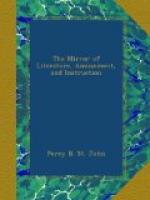Adam’s children buried their father, and wept for him thirty days; but Seth wept not. He planted the twig upon his father’s grave, at the head of the dead man, and named it the twig of the new life, of the awakening up out of the sleep of death. The little twig grew up into a high tree, and by it many of Adam’s children strengthened themselves with comfort of the other life. So it came to the following generation. In the garden of David it blossomed fair, until his infatuated son began to doubt on immortality; then withered the twig, though its blossoms came among other nations. And as on a stem from this tree, the restorer of immortality gave up his holy life; from it the fragrance of the new life scattered itself around far among all nations. W.G.C.
* * * * *
ANCIENT NAVAL LAWS.
The laws made by Richard I. for the preservation of good order in his fleet, when he was sailing to Palestine, were as follows:—He that kills a man on board shall be tied to the body and thrown into the sea. If he kills one on land he shall he buried with the same. If it be proved that any one has drawn a knife to strike another, or has drawn blood, he shall lose his hand. If he strike with his fist, without effusion of blood, he shall be thrice plunged into the sea. If a man insult another with opprobrious language, so often as he does it, to give so many ounces of silver. A man convicted of theft, to have his head shaved, and to be tarred and feathered on the head, and to be left on the first land the ship shall come to. Richard appointed officers to see these laws executed with rigour, two of which officers were bishops. A.H.K.—T.
* * * * *
NOTES OF A READER
THE ATMOSPHERE.—CLIMATOLOGY.
(FROM PART XIV. OF KNOWLEDGE FOR THE PEOPLE; OR, THE PLAIN WHY AND BECAUSE.)
Why may the atmosphere be termed a fourth kingdom of Nature?
Because it extends its influence in an equal degree over the three kingdoms, the animal, the vegetable, and the mineral, operates upon each after a distinct manner, and appears rather to be independent, and allied to all of them, than to be rightly included within any one.
Why is a knowledge of the atmosphere important to the naturalist?
Because it serves to throw much light on the history and functions both of the animal and vegetable creation; for it is through this great medium that heat, light, electricity, oxygen, and the great springs of vital phenomena, are conveyed to all classes of organized matter. It is by means of this wonderful agent, that we gain the theory of respiration in all classes of creatures possessing animal life; and that we become acquainted with the migrations of animals, as well as many of their peculiar instincts and habits.




